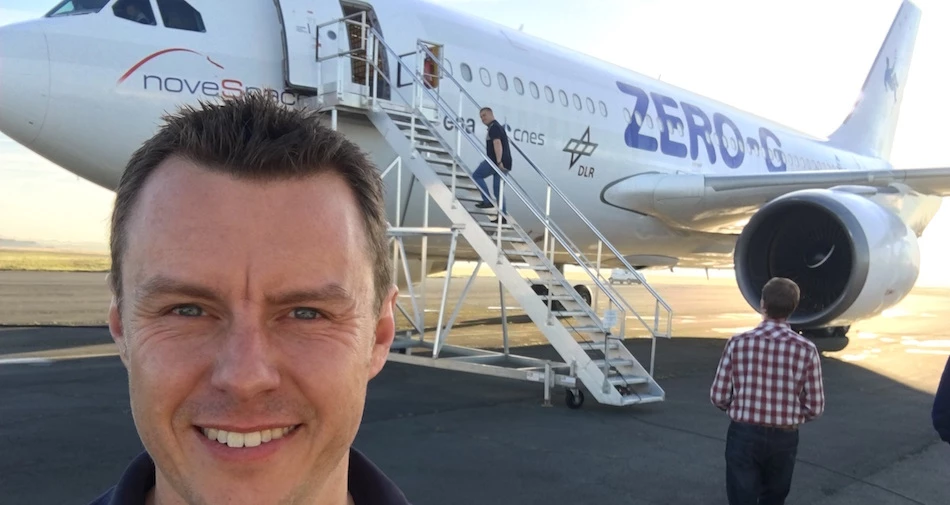
Partner Article
Could humans have the North East to thank if we're ever to colonise Mars?
After being selected by the European Space Agency (ESA) and funded by the UK Space Agency, academics from Northumbria University are putting their research to the test in a bid to improve the health and condition of astronauts travelling through space.
Professor Nick Caplan is leading the University’s research team, which will determine how a partial gravity environment affects our spinal muscles that work to maintain upright spinal posture.
Earlier this month, the team from Northumbria’s Aerospace Medicine and Rehabilitation Laboratory visited Novespace, in Bordeaux, France - which runs microgravity, airborne missions - to start planning their research that will fly as part of a partial gravity parabolic flight campaign in June 2018.
The Northumbria team will complete 93 parabolas over three flights, where the gravity level will reduce by up to 75% of the Earth’s gravity.
The Northumbria University team hopes their research will benefit the global aims of putting humans on the Moon again, as well as longer-term goals of humans colonising Mars.
Professor Nick Caplan, Professor of Aerospace Medicine and Rehabilitation at Northumbria University, said: “Following current missions to the International Space Station, astronauts return to Earth in a physiologically deconditioned state, where they have immediate access to medical support.
“When astronauts travel to Mars, they will arrive with deconditioned bodies, with limited access to medical support. We need to develop effective countermeasures to tackle this deconditioning, to make sure astronauts stay fit and healthy.”
This study is one of a series where Northumbria University has collaborated with the European Space Agency’s Space Medicine Office to look at spinal muscle health.
This research will also help people on Earth, such as those with low back pain who have similar spinal muscular changes to astronauts, with spaceflight ageing the body about seven times faster than normal ageing on Earth.
Northumbria University’s burgeoning Aerospace Medicine and Rehabilitation Laboratory is also home to the Aerospace Medicine Systematic Review Group, which has published reviews on the effects of partial gravity on the human body, as well as the effectiveness of countermeasures for preventing musculoskeletal deconditioning of the spine in microgravity, working with ESA’s Space Medicine Office.
Professor Caplan continued: “Our spinal muscles are known to become smaller and dysfunctional following extended periods of unloading, be it through actual or simulated spaceflight.
“This deconditioning of the spinal antigravity muscles contributes to an increased injury risk to astronauts when they return to Earth’s gravity, where many must undergo a period of intense rehabilitation.”
Professor Caplan will be speaking about his team’s upcoming experiment at the UK Space Agency conference on Research in Space and Space Analogues in London on 8th November 2017 along with other speakers including British ESA astronaut Tim Peake.
Libby Jackson, Human Spaceflight and Microgravity Programme Manager at the UK Space Agency, said: “We are delighted to be supporting the growing microgravity science community in this research.
“These exciting experiments will further our understanding of how the human body copes with the challenging environment of living and working in space, which in turn will help humans to carry out more research in space.”
Looking to promote your product/service to SME businesses in your region? Find out how Bdaily can help →
Enjoy the read? Get Bdaily delivered.
Sign up to receive our daily bulletin, sent to your inbox, for free.






 B Corp is a commitment, not a one-time win
B Corp is a commitment, not a one-time win
 Government must get in gear on vehicle transition
Government must get in gear on vehicle transition
 A legacy in stone and spirit
A legacy in stone and spirit
 Shaping the future: Your guide to planning reforms
Shaping the future: Your guide to planning reforms
 The future direction of expert witness services
The future direction of expert witness services
 Getting people into gear for a workplace return
Getting people into gear for a workplace return
 What to expect in the Spring Statement
What to expect in the Spring Statement
 Sunderland leading way in UK office supply market
Sunderland leading way in UK office supply market
 Key construction developments in 2025
Key construction developments in 2025
 Mediation must be part of planning process
Mediation must be part of planning process
 From apprentice to chief financial officer
From apprentice to chief financial officer
 Don't stifle growth with apprenticeship cuts
Don't stifle growth with apprenticeship cuts